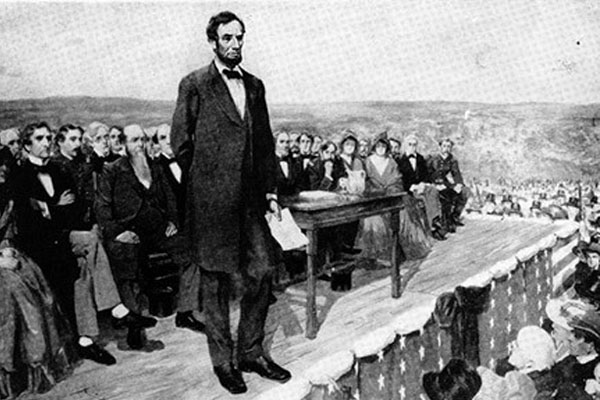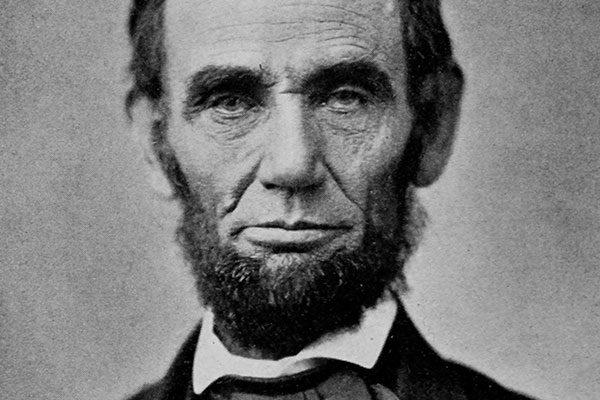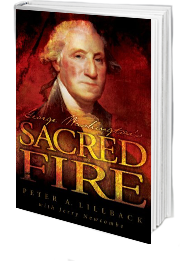Abraham Lincoln
Abraham Lincoln was a tall man in his day, and with the passing of time, his stature has increased. Almost like a national saint, his heroic work and tragic death create a sense of awe. His poignant rhetoric still captures the mind and stirs the heart.
The connection between Lincoln and our nation’s motto brings us to the anguished era of the American Civil War. The Civil War and its profound suffering emerged from the deep divisions caused by the slave trade. The profound turmoil of that terrible conflict forced the nation to reflect upon the ultimate realities of life.
Slavery in America
The desire to end slavery was expressed early on by many of our Founders. Accordingly, both George Washington and Thomas Jefferson, although slave-holders, became convinced of the evils of the slave trade. Ultimately through their wills, each freed their slaves at Mt. Vernon and Monticello respectively.
Gradually, the idea developed that the nation faced divine judgment because of its allowance of slavery. Reflecting on slavery, and its impact on America, Jefferson worried about God’s impending providential judgment upon the new nation:
God who gave us life gave us liberty. And can the liberties of a nation be thought secure when we have removed their only firm basis, a conviction in the minds of the people that these liberties are of the Gift of God? That they are not to be violated but with His wrath? Indeed, I tremble for my country when I reflect that God is just; that His justice cannot sleep forever.
George Mason, also a Virginian like Washington and Jefferson, was a delegate at the Continental Congress. In fact, he owned one of the largest plantations in Virginia, some 5,000 acres in size utilizing 200 slaves. At the Continental Congress, he poignantly declared:
Every master of slaves is born a petty tyrant. They bring the judgment of heaven upon a country. As nations cannot be rewarded or punished in the next world, they must be in this. By an inevitable chain of causes and effects, Providence punishes national sins by national calamities.
Lincoln: The Theologian of American Anguish
But it was not until Abraham Lincoln’s presidency that America finally had to face the moral consequences of slavery. As the Civil War unfolded, Lincoln, “the theologian of American anguish,” repeatedly turned to the providence of God as a source of hope and encouragement and to explain why the war began and continued.
Lincoln conceived of his work as President as an expression of God’s providence. On November 14th in 1872, J. A. Reed related in a letter to a friend what he claimed President Abraham Lincoln had said to him in late December, 1862:
I hold myself in my present position and with the authority vested in me as an instrument of Providence. I have my own views and purposes, I have my convictions of duty, and my notions of what is right to be done. But I am conscious every moment that all I am and all I have is subject to the control of a Higher Power, and that Power can use me or not use me in any manner, and at any time, as in His wisdom and might may be pleasing to Him.
To an assembly of ministers, Mr. Lincoln declared his trust in this Providence, and how this provided aid to his leadership:
If it were not for my firm belief in an overruling Providence, it would be difficult for me, in the midst of such complications of affairs, to keep my reason on its seat. But I am confident that the Almighty has His plans, and will work them out; and, whether we see it or not, they will be the best for us.
As he wrestled with the spiritual concerns of the Civil War, he wrote on September 30, 1862,
The will of God prevails. In great contests each party claims to act in accordance with the will of God. Both may be, and one must be, wrong. God cannot be for and against the same thing at the same time. In the present civil war, it is quite possible that God’s purpose is something different from the purpose of either party; and yet the human instrumentalities, working just as they do, are of the best adaptation to effect His purpose.
In this meditation from 1862, he expressed his belief that the conflict was in God’s will:
I am almost ready to say this is probably true; that God wills this contest, and wills that it shall not end yet. By His mere great power on the minds of the now contestants, he could have either saved or destroyed the Union without a human contest. Yet the contest began. And, having begun, He could give the final victory to either side any day. Yet the contest proceeds…
In 1862, President Lincoln was urged by several ministers from Chicago to issue a Proclamation of Emancipation. The President responded that he had already been counseled by religious men who held opposite views. Yet all were equally certain that they were speaking for God. His hope was that God would let him know His will directly:
I hope it will not be irreverent for me to say that if it is probable that God would reveal His will to others on a point so connected with my duty, it might be supposed He would reveal it directly to me; for, unless I am more deceived in myself than I often am, it is my earnest desire to know the will of Providence in this matter.


Call for a Day of Prayer and Fasting:
Lincoln’s faith and reliance upon God and His Providence were demonstrated again in his calling for a day of fasting and prayer on March 30, 1863:
Whereas, the Senate of the United States, devoutly recognizing the Supreme Authority and just Government of Almighty God, in all the affairs of men and of nations, has, by a resolution, requested the President to designate and set apart a day for National prayer and humiliation.
And whereas it is the duty of nations as well as of men, to own their dependence upon the overruling power of God, to confess their sins and transgressions, in humble sorrow, yet with assured hope that genuine repentance will lead to mercy and pardon; and to recognize the sublime truth, announced in the Holy Scriptures and proven by all history, that those nations only are blessed whose God is the Lord.
And, insomuch as we know that, by His divine law, nations like individuals are subjected to punishments and chastisements in this world, may we not justly fear that the awful calamity of civil war, which now desolates the land, may be but a punishment, inflicted upon us, for our presumptuous sins, to the needful end of our national reformation as a whole People? We have been the recipients of the choicest bounties of Heaven. We have been preserved, these many years, in peace and prosperity. We have grown in numbers, wealth and power, as no other nation has ever grown. But we have forgotten God. We have forgotten the gracious hand which preserved us in peace, and multiplied and enriched and strengthened us; and we have vainly imagined, in the deceitfulness of our hearts, that all these blessings were produced by some superior wisdom and virtue of our own. Intoxicated with unbroken success, we have become too self-sufficient to feel the necessity of redeeming and preserving grace, too proud to pray to the God that made us!
It behooves us then, to humble ourselves before the offended Power, to confess our national sins, and to pray for clemency and forgiveness.
Now, therefore, in compliance with the request, and fully concurring in the views of the Senate, I do, by this my proclamation, designate and set apart Thursday, the 30th. day of April, 1863, as a day of national humiliation, fasting and prayer. And I do hereby request all the People to abstain, on that day, from their ordinary secular pursuits, and to unite, at their several places of public worship and their respective homes, in keeping the day holy to the Lord, and devoted to the humble discharge of the religious duties proper to that solemn occasion.
All this being done, in sincerity and truth, let us then rest humbly in the hope authorized by the Divine teachings, that the united cry of the Nation will be heard on high, and answered with blessings, no less than the pardon of our national sins, and the restoration of our now divided and suffering Country, to its former happy condition of unity and peace….
Second Inaugural Address
In his Second Inaugural Address,Lincoln addressed the nation with an absolute and resolute dependence upon the sovereignty of divine providence. Given on March 4, 1865, he found the providential rule of God as the overarching reality in the anguish of the Civil War. His eloquent words are suffused in biblical imagery:
If we shall suppose that American Slavery is one of those offences which, in the providence of God, must needs come, but which, having continued through His appointed time, He now wills to remove, and that He gives to both North and South, this terrible war, as the woe due to those by whom the offence came, shall we discern therein any departure from those divine attributes which the believers in a Living God always ascribe to Him? Fondly do we hope—fervently do we pray—that this mighty scourge of war may speedily pass away. Yet, if God wills that it continue, until all the wealth piled by the bondman’s two hundred and fifty years of unrequited toil shall be sunk, and until every drop of blood drawn with the lash, shall be paid by another drawn with the sword, as was said three thousand years ago, so still it must be said “the judgments of the Lord, are true and righteous altogether.” With malice toward none; with charity for all; with firmness in the right, as God gives us to see the right, let us strive on to finish the work we are in; to bind up the nation’s wounds; to care for him who shall have borne the battle, and for his widow, and his orphan—to do all which may achieve and cherish a just and lasting peace, among ourselves, and with all nations.
Lincoln’s faith in the transcendent purposes of a God of providence gave him hope in his quest to try to heal the torn and wounded nation.
